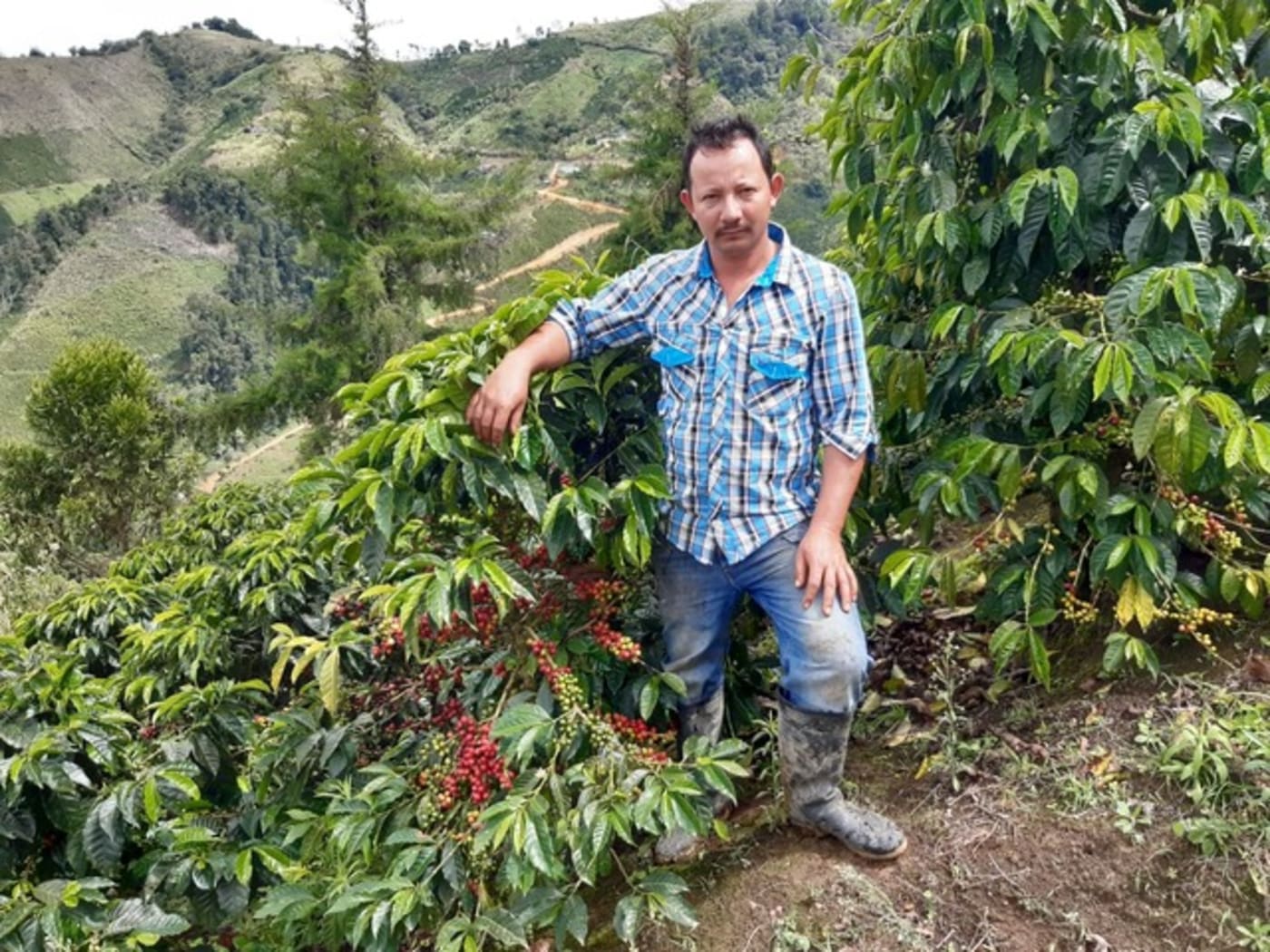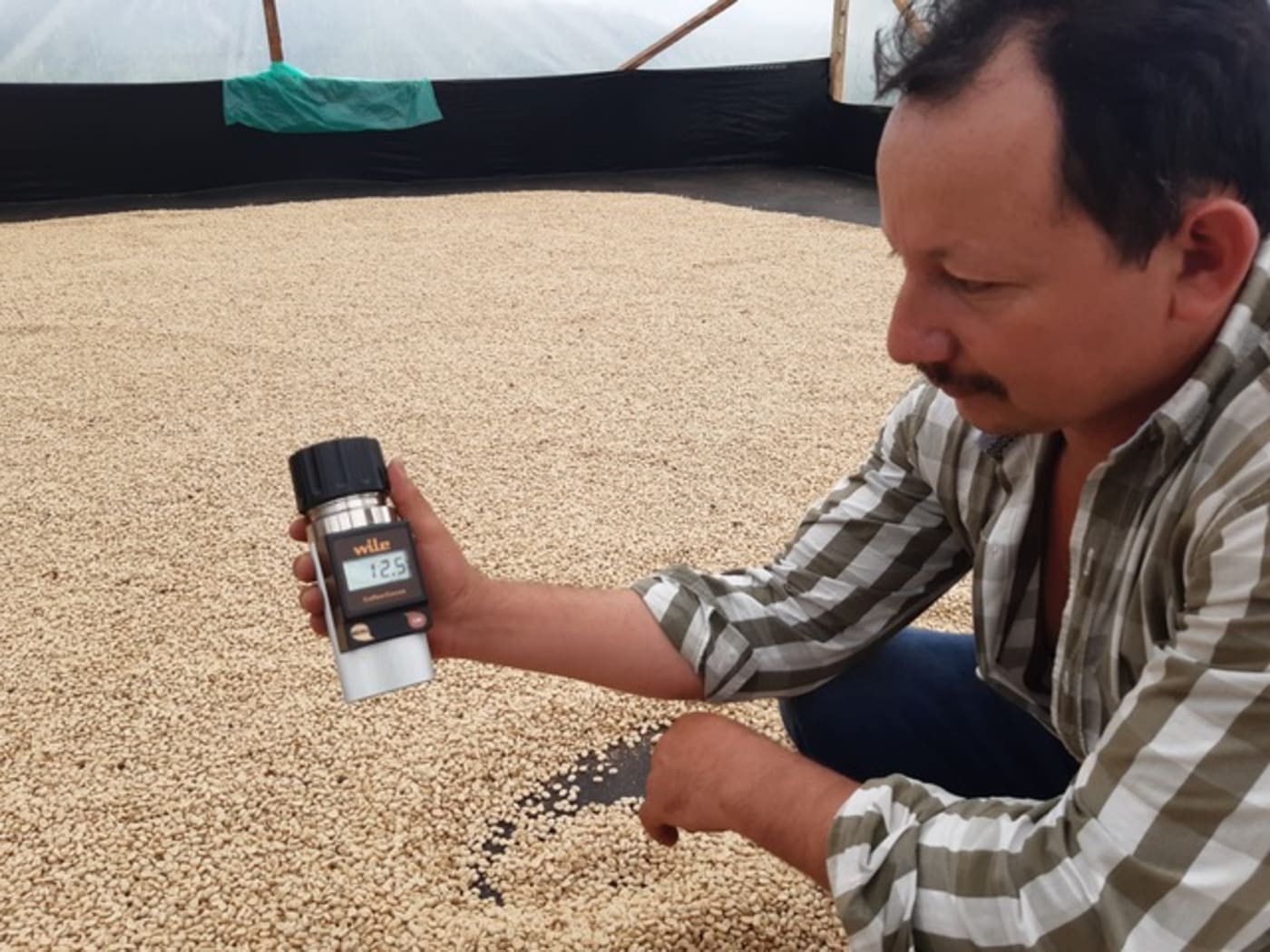-
Producer
-
Alexander Vargas & Lidia Majin
-
Country
- Colombia
-
Region
-
Huila
-
Altitude
-
1870m above sea level
-
Variety
-
Process
-
Importer
-
Caravela
-
Body
-
-
Acidity
-
-
Tasting notes
-
Plum, blackcurrant and malt
-
Roast style
Colombia
Finca La Piragua
Alexander and Lidia started their coffee farm from scratch around 20 years ago. This washed Caturra lot has hints of plum, blackcurrant and malt.
Alexander and Lidia started their coffee farm from scratch around 20 years ago. This washed Caturra lot has hints of plum, blackcurrant and malt.
Coffee has always played a significant part in Alexander Vargas’ life—he comes from a coffee-growing family. Around the 2000s, he decided to start producing coffee on his own. He found a piece of land with no more than a few weeds, gave it a good clean and planted the first coffee trees. It’s not common to see young farms built relatively recently from scratch like these.
Finca La Piragua extends through 10 hectares of land, 7 of which produce coffee. The rest are dedicated to pitaya (or dragon fruit), in an effort to diversify the crop. Alexander works together with his wife, Lidia. He takes care of the harvesting, and they both work through the fermentation and drying processes.
Their move into specialty coffee production started around 2006 as a way to add value to their product and find recognition for their hard work. To achieve this, Alexander joined a group called Café Quebradón, where he gained much knowledge and experience that then applied to Finca La Piragua. This learning is always ongoing, and he is currently working on improving his processes and infrastructure to elevate the quality of his beans.
This lot is a Caturra varietal that has grown in a sun-rich plot of land. The fermentation method is a traditional washed process: fermented in water for 24 hours, then dried on raised beds in covered patios.


Certifications: Fairtrade, C.A.F.E. Practices.
All the images and information about this coffee and producers have been kindly shared by its importer, Caravela Coffee, and edited by us, Sample Coffee (unless linked to or credited otherwise).
Learn everything about this coffee:
Ethical, traceable sourcing
This page has all the sourcing information (variety, process, region, story, importer, and more) that our importers share with us, and give us permission to use.
The transparency helps us talk confidently about the quality and background of our product, and it helps you know exactly what you’re buying.
Learn more:
Coffee page transparency legend
Our coffee philosophy
Our business approach
Fresh harvest coffee
We only source and roast coffee from each country’s latest harvest season (so the green coffee is never older than 1 year from the time of picking, processing and packing). This ensures the sensory qualities are always at their peak and unaffected by excessive ageing.
Roasted for espresso and filter (best enjoyed black)
Roast style: omni. Omni roasts are designed to brew and taste great both as espresso and filter. Our omni single origins generally sit on Agtron values in the ~70-60 value range. So, technically, they are somewhere in the lighter side of the medium spectrum.
Designed for espresso and filter brewing. Best enjoyed black.
Learn more:
Our Loring Kestrel S35 roaster
Our roasting style and approach
Best brewed within days 15-49 post-roast
The ‘fresh is best’ saying doesn’t apply to coffee (contrary to popular belief). Waiting before opening and brewing your bag of whole coffee beans helps develop peak flavour and acidity.
But heads up: if you buy pre-ground coffee, brew it as soon as possible.
Learn more:
Our recommended brewing window
Try our custom brewing recipes
Our recipes and ratios are tailored to our coffee sourcing and roasting styles, bringing the best flavour and feel out of each coffee.
For pour over, immersion, and other filter brewing styles, check our brew guides.
For our espresso single origins, we recommend a coffee:yield ratio of 1:3:
- Dose: 20g ground coffee
- Yield: 60g espresso
- Total brew time: ~24-28 seconds
This is just a starting point! We encourage you to experiment, taste, and adjust to find the recipe that you enjoy the most.
Learn more:
Our espresso brew guide (single origin)
Brewing ratio calculator
Packaging and sustainability
- Bags: ABA-certified home compostable (AS 5810-2010)
- Labels: recyclable
- Valves (only on +250g bags): general waste
- Box and tape (online orders): recyclable
Learn more:
Our packaging
Variety
Caturra variety
Caturra is a natural mutation of Bourbon that was originally discovered in Brazil in 1937, considered to be the first naturally occurring mutation ever discovered.
The location
Coffee from Colombia
Colombia is one of the largest coffee producers in the world and benefits greatly from having one of the most unique and complex set of micro-climates of all coffee producing nations.
The Huila region of Colombia
This region boasts the perfect combination of high quality soil and geography and is quickly becoming one of the largest coffee producing regions in Colombia. One of the best regarded regions for high quality, fruit driven coffee.
Farm processes
Washed process
Machines are used to remove the flesh from the coffee cherry before being fermented in water, washed again, and finally sun dried. This process tends to result in more distinct, cleaner flavours.

Subscribe to a world of coffee
Discover a new single origin coffee from Sample every 1-5 weeks with no delivery fees.
No up-front purchase, and you can pause, cancel, or change plans at any time.
Available to order online this week:

Rwanda Kibirizi
Flavours of mandarin, raisin, apple
Body Acidity
Washed Bourbon
June 2025 harvest
Roasted omni for filter and espresso
Rwanda Kibirizi online
Ethiopia Tadese Teko
Flavours of bergamot, mandarin, mango
Body Acidity
Washed Ethiopian Heirloom
January 2025 harvest
Roasted omni for filter and espresso
Ethiopia Tadese Teko online
Mexico Isavel Lopez Pablo
Flavours of sugarcane, dried cranberry, white peach
Body Acidity
Washed Typica
April 2025 harvest
Roasted omni for filter and espresso
Mexico Isavel Lopez Pablo online
Kenya Karimikui
Flavours of blood orange, blackberry, plum jam
Body Acidity
Washed Batian, SL28, SL34, Ruiru 11
November 2024 harvest
Roasted omni for filter and espresso
Kenya Karimikui online